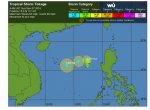- Joined
- Jul 19, 2012
- Messages
- 14,185
- Reaction score
- 8,768
- Location
- Houston
- Gender
- Male
- Political Leaning
- Libertarian
Lots of complaining about links to wattsupwiththat.com from certain people. The main complaint seems to be that links to WUWT are posted at all. They appear to want restrictions on free speech here to the effect that only blogs they approve of can be linked.
In any case, here's another link to WUWT. We'll see how our alarmist friends can do with this thesis, which you can only read about in blogs and the like. It hasn't been possible to get it published in peer review literature for reasons that seem pretty obvious to me. We'd like to hear about views of the science; appeals to authority do not impress because we think the authorities are whack, compromised, corrupted.
Needle in a Haystack. Global Climate Model Error
In short: While general circulation models, i.e., global climate models, agree with each other, that is, they have good precision, this scientist shows that it's impossible for them to be accurate, that is, to actually predict future temperatures or conditions, because of errors that get propagated through the model. Specifically, errors in assumptions for cloudiness get passed on from iteration to iteration of the model. The errors don't cancel out because they are not random, they are systemic. Instead, the errors from the previous iteration get added to that of the next iteration.
I always suspected that this would be a problem with the models, but I didn't have the skill with statistics to express it formally. When you use an iterative model, when the predicted state at one time is used to calculate the next state, then the errors are bound to build up.
In any case, here's another link to WUWT. We'll see how our alarmist friends can do with this thesis, which you can only read about in blogs and the like. It hasn't been possible to get it published in peer review literature for reasons that seem pretty obvious to me. We'd like to hear about views of the science; appeals to authority do not impress because we think the authorities are whack, compromised, corrupted.
Needle in a Haystack. Global Climate Model Error
In short: While general circulation models, i.e., global climate models, agree with each other, that is, they have good precision, this scientist shows that it's impossible for them to be accurate, that is, to actually predict future temperatures or conditions, because of errors that get propagated through the model. Specifically, errors in assumptions for cloudiness get passed on from iteration to iteration of the model. The errors don't cancel out because they are not random, they are systemic. Instead, the errors from the previous iteration get added to that of the next iteration.
I always suspected that this would be a problem with the models, but I didn't have the skill with statistics to express it formally. When you use an iterative model, when the predicted state at one time is used to calculate the next state, then the errors are bound to build up.

